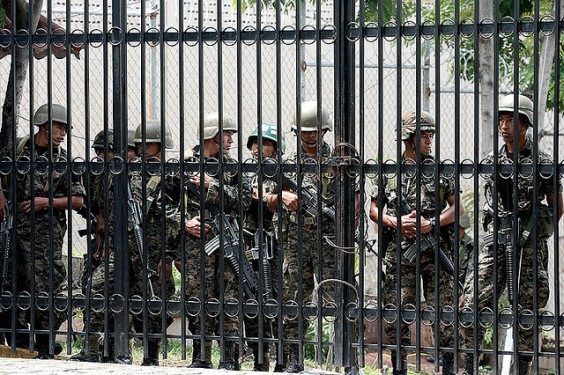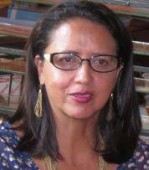Standing Up to Fear to Give Truth Oxygen

To maintain peace, Honduran authorities give the country's military great power. Photo via Flickr user: rbreve.
In her first column for Sampsonia Way, Honduran journalist Dina Meza provides a historical context to the importance of freedom of expression in her native country.
Last night I dreamed that all of us were standing up to say no to silence. In Honduras, an oxygen tank sustains freedom of expression, endangered by those who would cut the lines with impunity.

- Honduras has one of the world’s highest murder rates. It is also one of the most dangerous countries to practice journalism, ranking 129th out of 180 in the 2014 World Press Freedom Index. Journalists are regularly threatened, attacked, and killed for their work. The Honduran government fails to punish those who use violence against reporters, essentially granting them impunity. This space will be dedicated to examining the lack of protection for Honduran journalists exercising their profession. Topics will include the use of state-sponsored advertising as a mechanism to reward or punish publications, and censorship and self-censorship as hindrances to democratic progress.

- Born in Cofradía, Honduras, Dina Meza has been recognized by PEN International, Amnesty International, Index on Censorship and Reporters without Borders for her work as a journalist and human rights advocate. Currently, Dina is the driving force behind the creation of Honduras PEN Centre. In 2013, she wrote “Reign of Terror,” an in-depth report on threats to Honduran journalists for Index on Censorship’s magazine. In 2014, she was named one of Reporters Without Borders’ “100 Heroes and Heroines of Information.”
In reality, this is how we now find freedom of expression, the most fundamental right of human beings, traversing all other rights.
Honduras is a country of 8.5 million inhabitants. It is located in the middle of Central America; a strategic position for the region. Its territory has been disgraced by foreign intervention. At present, the United States has six military bases in different locations around the country.
1982 saw the initiation of a democratic process that claimed to put an end to the illegal military coups. The Honduran people would supposedly be able to choose their rulers with their votes.
This vision remains a dream. Although we can vote, our votes do not matter because the elections are not transparent. The person who comes to power is whomever the United States favors, whoever is suitable to the Honduran oligarchy that has partitioned out the power for over 100 years.
After more than 100 years of degradation, of impoverishing the population, the country now finds itself among the nations of Latin America and the Caribbean with the lowest incomes.
National and international economic groups prey upon Honduras’s wealth in natural resources. Government lackeys who will strip away the property of the population for a few silver coins put it up to auction and sell it to the highest bidder.
Honduras was the scene of a coup d’état on June 28, 2009. The oligarchy dealt an incipient democracy a hard blow, and since that date anyone who tries to talk about the nation’s problems is kept under close watch.
Journalists and social communicators, because their business is the transmission of information, have been under constant attack, sometimes resulting in the loss of their lives. Nearly 50 are in graves. In other countries, where assassination is not yet a form of shutting someone up, criticism would not go beyond angering state officials.
But that is not what happens here in Honduras. Not only is there anger, but there are also threats, attacks, harassment, judicial proceedings, surveillance and in the worst cases, la meurte termina con la palabra, or “death comes at the end of the word.”
After the coup d’état, nothing is hidden anymore. One can now plainly see the actions of those who want to guard silence around crucial topics such as militarism, corruption, organized crime, drug trafficking, the concessions of rivers and other natural resources, violations of human rights, and authoritarianism.
The coup has exacerbated the state’s intolerance and violence. An official proposed using bonfires to burn books that were not to the liking of the Honduran oligarchy.
In 2013, through a process of fraudulent elections, Juan Orlando Hernández rose to power. Since then, it has become common to hear public accusations against journalists who ask him about his actions as president, or commit acts that deemed to be at odds with the law. Honduran journalists face direct reprisals, including threats from the Public Ministry, or being followed by motorcycles or strange cars after attending press conferences.
With the coup d’état, institutionalism has ended in Honduras. To maintain “the peace” among the population resistant to the coup, the elite hire paramilitary groups and approve laws that allow them to listen in on private phone conversations, classify public information and give military officials more power.
The present leader has pretensions to stay in power for many years, in spite of the fact that the Constitution of the Republic only permits a four-year term.
But he has gone about creating a precise scenario that will allow him to bypass the law. He has the Public Ministry, the Supreme Court, the National Congress, and the corporate media under his control, and uses his power to pressure the independent media that criticizes his authoritarianism.
The outlook for 2015 is dark, as are the plans to accomplish freedom of expression in Honduras. For the press, the order of the day is silence. If they stray from the established agenda, they face bullets and death.





One Comment on "Standing Up to Fear to Give Truth Oxygen"
Trackbacks for this post